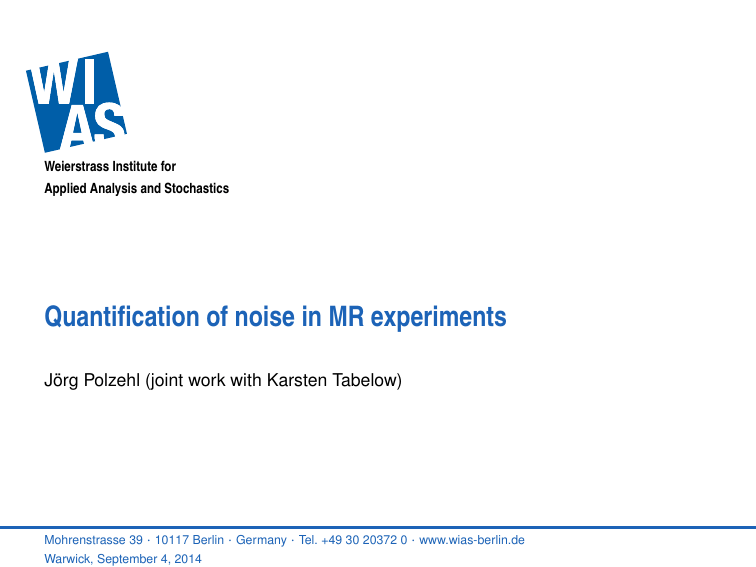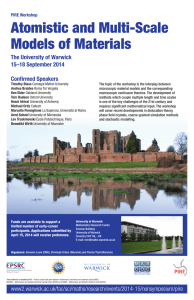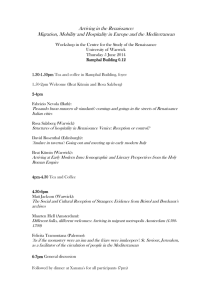Quantification of noise in MR experiments Weierstrass Institute for
advertisement

Weierstrass Institute for
Applied Analysis and Stochastics
Quantification of noise in MR experiments
Jörg Polzehl (joint work with Karsten Tabelow)
Mohrenstrasse 39 · 10117 Berlin · Germany · Tel. +49 30 20372 0 · www.wias-berlin.de
Warwick, September 4, 2014
Outline
Noise distribution in single and multiple coil systems
Diffusion MRI
Problems in modeling low SNR data
Localized noise quantification
Examples
Quantification of noise in MR experiments · Warwick, September 4, 2014 · Page 2 (20)
Noise distribution in single coil systems
complex signal in K-space (one coil):
2
sc (k) ∼ N (xc (k), σK
)
FFT provides complex valued image
Sc (x) ∼ N (ξc (x), σI2 )
MR image:
S(x) usually obtained as
magnitude image
Notation: Si = |S(xi )|
χ
Si /σI ∼ χ2,ηi with ηi = |ξc (xi )|/σI
Signal distribution: scaled noncentral
(Rician distribution Gudbjatrtsson
(1995))
Problem:
ESi /σI > ηi
Image: F. Godtliebsen (Tromsœ)
Quantification of noise in MR experiments · Warwick, September 4, 2014 · Page 3 (20)
Image reconstruction from multiple coils
8 − 32 spherically arranged receiver coils
inhomogeneous coil sensitivities or encoding
matrices, correlation between receiver coils
image reconstruction from coils
k = 1, . . . , K
as
SOS:
Si =
sX
Sk (xi )2
k
inefficient, but known distribution, location
dependent σI,i
Si /σI,i ∼ χ2K,ηi
with
ηi =
sX
8-coil system (noiseless situation):
ξk (xi )ξ¯k (xi )/σI,i
k
Images from receiver coils and
combined image
σI,i depends on correlations
Quantification of noise in MR experiments · Warwick, September 4, 2014 · Page 4 (20)
Image reconstruction from multiple coils
8 − 32 spherically arranged receiver coils
inhomogeneous coil sensitivities or encoding
matrices, correlation between receiver coils
image reconstruction from coils
k = 1, . . . , K
as
GRAPPA: (Griswold 2002)
Ek encoding matrices (coil sensitivity + FFT),
E = (E1 , . . . , EK ), Ψ = cov()
sk = Ek Sk + k
S = (E H Ψ −1 E)−1 E H Ψ −1 (s1 , . . . , sK )
efficient, but only approximatively
Si /σI,i ∼ χ2Li ,ηi
with location dependent Li and σI,i
σI,i depends on encoding matrices,
8-coil system (noiseless situation):
Images from receiver coils and
combined image
correlations
Quantification of noise in MR experiments · Warwick, September 4, 2014 · Page 4 (20)
Image reconstruction from multiple coils
8 − 32 spherically arranged receiver coils
inhomogeneous coil sensitivities or encoding
matrices, correlation between receiver coils
image reconstruction from coils
k = 1, . . . , K
as
SENSE: (Pruessmann 1999), SENSE-1:
(Sotiropoulos 2013)
Si = |
X
cik Sk (xi )|
efficient, known distribution, location dependent
σI,i , low df
Si /σI,i ∼ χ2,ηi
8-coil system (noiseless situation):
with
ηi = |
X
cik ξk (xi )|/σI,i
Images from receiver coils and
combined image
σI,i depends on coil sensitivities, correlations
Quantification of noise in MR experiments · Warwick, September 4, 2014 · Page 4 (20)
Diffusion MRI
Additional diffusion gradient:
Figure: Thomas Schultz (Wikimedia)
Object of interest:
P (~r, ~r 0 , τ ) - probability density for a particle (spin) to “travel” from
position ~
r to ~r in time τ
Diffusion propagator:
0
V (Ensemble Averaged Propagator, EAP):
Z
~ τ) =
P (R,
P (~r, ~r 0 , τ ) p(~r 0 ) d~r 0 ,
Aggregate over a voxel
~ r −~
~
r 0 ∈V, R=~
r0
0
p(~r ) - initial probability density of particle location
Quantification of noise in MR experiments · Warwick, September 4, 2014 · Page 5 (20)
Diffusion Tensor Imaging (DTI)
Diffusion gradients lead to signal attenuation due to diffusion process - loss of phase
coherence between precessing spins:
ζ(~
q , τ ) = ζ0 hexp(iϕ)i
Fourier relation
S(~
q , τ )/σI ∼ χ2L,ζ(~q,τ )/σI
Z
~
~ τ ) ei~q R
~
P (R,
dR
ζ(~
q , τ ) = ζ0
IR3
Quantification of noise in MR experiments · Warwick, September 4, 2014 · Page 6 (20)
Diffusion Tensor Imaging (DTI)
Diffusion gradients lead to signal attenuation due to diffusion process - loss of phase
coherence between precessing spins:
ζ(~
q , τ ) = ζ0 hexp(iϕ)i
Fourier relation
S(~
q , τ )/σI ∼ χ2L,ζ(~q,τ )/σI
Z
~
~ τ ) ei~q R
~
P (R,
dR
ζ(~
q , τ ) = ζ0
IR3
S(~
q , τ ), q = cb1/2 g , (||g||=1) at N voxel locations (e.g.
N = 128 · 128 · 60) for 6, . . . , 200 ~g vectors and (multiple) b
Experiment: Measure
Diffusion tensor model: Assumes Gaussian diffusion
ζi = ζ0,i exp(−b~g > Di~g )
Diffusion tensor:
Di , Gradient direction ~g , Gradient strength (b-value) b
Characteristics: Fractional FA, eigenvectors
s
FA =
3 (λ1 − λ̄)2 + (λ2 − λ̄)2 + (λ3 − λ̄)2
2
λ21 + λ22 + λ23
Quantification of noise in MR experiments · Warwick, September 4, 2014 · Page 6 (20)
Motivation
Interest in high resolution dMRI
Interest in more sophisticated models, e.g. Kurtosis tensor model, tensor mixtures –>
need for multiple b-values
Both lead to low SNR situations
1.2mm isotrope dMR images 3T (clinical scanner) , b-values 800 and 2000, Data: S.
Mohammadi (UCL)
can we quantify of low SNR on results
can we handle low SNR situations –> here and K. Tabelows talk
Quantification of noise in MR experiments · Warwick, September 4, 2014 · Page 7 (20)
Impact of low SNR on estimated FA
Estimation using (incorrect) nonlinear regression model:
(ζ̂0,i , D̂i ) = argmin
ζ0,i ,Di
b,g
0.4
Bias of FA estimate bv=3000 for different S0/sigma
0.4
Bias of FA estimate bv=2000 for different S0/sigma
0.4
Bias of FA estimate bv=1000 for different S0/sigma
X
(Si (~
q , τ ) − ζ0,i exp(−b~g > Di~g ))2
0.2
0.4
0.6
FA
0.8
0.0
−0.6
−0.4
−0.2
Bias
0.0
Bias
−0.2
−0.4
−0.6
−0.6
−0.4
−0.2
Bias
0.0
0.2
SNR=10
SNR=20
SNR=40
SNR=80
0.2
SNR=5
SNR=10
SNR=20
SNR=40
0.2
SNR=2.5
SNR=5
SNR=10
SNR=20
0.2
0.4
0.6
FA
0.8
Quantification of noise in MR experiments · Warwick, September 4, 2014 · Page 8 (20)
0.2
0.4
0.6
FA
0.8
Impact of model bias on FA
Bias due to model misspecification:
(ζ̃0,i , D̂i ) = argmin
ζ0,i ,Di
b,g
0.4
Bias of FA estimate bv=3000 for different S0/sigma
0.4
Bias of FA estimate bv=2000 for different S0/sigma
0.4
Bias of FA estimate bv=1000 for different S0/sigma
X
(ESi (~
q , τ ) − ζ0,i exp(−b~g > Di~g ))2
0.2
0.4
0.6
FA
0.8
0.0
−0.6
−0.4
−0.2
Bias
0.0
Bias
−0.2
−0.4
−0.6
−0.6
−0.4
−0.2
Bias
0.0
0.2
SNR=10
SNR=20
SNR=40
SNR=80
0.2
SNR=5
SNR=10
SNR=20
SNR=40
0.2
SNR=2.5
SNR=5
SNR=10
SNR=20
0.2
0.4
0.6
FA
0.8
Quantification of noise in MR experiments · Warwick, September 4, 2014 · Page 9 (20)
0.2
0.4
0.6
FA
0.8
Impact of low SNR on max. Eigenvalue
0.2
0.4
0.6
FA
0.8
−0.4
rel. Bias
SNR=20
SNR=20 (ExpV)
SNR=40
SNR=40 (ExpV)
−0.6
−0.4
rel. Bias
SNR=10
SNR=10 (ExpV)
SNR=20
SNR=20 (ExpV)
−0.6
−0.6
−0.4
rel. Bias
SNR=5
SNR=5 (ExpV)
SNR=10
SNR=10 (ExpV)
−0.2
−0.2
−0.2
0.0
bv=3000: rel. bias of first eigenvalue
0.0
bv=2000: rel. bias of first eigenvalue
0.0
bv=1000: rel. bias of first eigenvalue
0.2
0.4
0.6
FA
0.8
0.2
Bias in eigenvalues is caused by model bias and data variability !
need to address both !
for both we need to quantify the data variability !
Quantification of noise in MR experiments · Warwick, September 4, 2014 · Page 10 (20)
0.4
0.6
FA
0.8
Impact of low SNR on other Eigenvalues
SNR=10
SNR=10 (ExpV)
SNR=20
SNR=20 (ExpV)
SNR=20
SNR=20 (ExpV)
SNR=40
SNR=40 (ExpV)
rel. Bias
0.05
rel. Bias
0.2
−0.2
−0.05
0.0
0.00
0.0
rel. Bias
0.2
0.10
0.4
0.4
0.15
0.6
SNR=5
SNR=5 (ExpV)
SNR=10
SNR=10 (ExpV)
bv=3000: rel. bias of first eigenvalue
0.20
bv=2000: rel. bias of first eigenvalue
0.6
bv=1000: rel. bias of first eigenvalue
0.2
0.4
0.6
FA
0.8
0.2
0.4
0.6
FA
0.8
0.2
Bias in eigenvalues is caused by model bias and data variability !
need to address both !
for both we need to quantify the data variability !
Quantification of noise in MR experiments · Warwick, September 4, 2014 · Page 11 (20)
0.4
0.6
FA
0.8
Problems and consequences
Severe bias of estimates (and instability) for
high resolution imaging (SNR proportional to voxel volume)
high b-values
Correct models: Di = RiT Ri , p = (~
g , b), ζp,i = ζp,0 exp(−b~g T Di~g )
Likelihood:
l({Sp,i }p ; {σp,i }p , Li ; ζ0,i , Ri ) =
!
"
2
#
Li (1−Li )
2 X
Sp,i
ζp,i
+ ζp,i
1 Sp,i
ζp,i Sp,i
−
+ log ILi −1
,
log
2
2
2
σp,i
2
σp,i
σp,i
p
Quasi-likelihood:
µ, ν expectation and variance of χ2Li ,ζp,i /σp,i
R({Sp,i }p ; {σp,i }p , Li ; ζ0,i , Ri ) =
X (Sp,i − µ(ζp,i /σp,i , σp,i , Li ))2 p
Require correct assessment of σp,i and Li
Quantification of noise in MR experiments · Warwick, September 4, 2014 · Page 12 (20)
ν(ζp,i /σp,i , σp,i , Li )
Local estimation of σp,i
Assumptions:
Si /σi ∼ χ2L,ζi /σi
ζi local constant
local homogeneity of tissue and fiber direction
(diffusivity)
σi slowly varying in space
smooth variation of coil sensitivities
local variation of ζ0
Sequential multi-scale algorithm
Using local weighted likelihood estimates for ζi and
Robust (median) smoothing for estimated
σi
σi
Weighting schemes by localization in image space and
adaptation in parameter space
Alternatives
Global estimates from background
Methods from Aja-Fernandez (201x), Landman (2009)
Quantification of noise in MR experiments · Warwick, September 4, 2014 · Page 13 (20)
local variation of σ for artificial
8-coil system and SENSE-1
Algorithm
(0)
Initialization: , σ̃i
(0)
(0)
= 1, Ni
= σ̄ (global), ζ̂i
= 1, ∀i, k := 1, Sequence of increasing
bandwidths h(k) .
Compute adaptive weights
(k)
wij
= Kloc
(k)
and Ni
=
P
ki − jk
h(k)
j
Kst
(k−1)
Ni
(k−1)
(k−1)
(k−1)
(k−1)
KLPS (ζ̂i
, σ̃i
), (ζ̂j
, σ̃i
)
λ
(k)
wij
(k)
Estimation: If Ni
P (k)
:= j wij > N0 obtain estimates for ζi and σi by weighted log-likelihood
X (k)
(k) (k)
= argmax
wij log pS (Sj ; ζ, σ).
σ̂i , ζ̂i
(ζ,σ)
(k)
Otherwise set σ̃i
(k−1)
:= σ̃i
(k)
and ζ̂i
:=
j
r
P
(k)
j
wij Sj2 /
P
wij − 2Li (σ̃i
(k)
(k)
Median smoothing: If Ni
> N0 set σ̃i = medianj:kxi −xj k1 <hmed
Stopping: If k = k ∗ stop, else increase k by 1 and recompute weights.
Quantification of noise in MR experiments · Warwick, September 4, 2014 · Page 14 (20)
(k−1) 2
)
(k)
j
(k)
σ̂j
+
Simulated example: 8 coil system with SENSE-1
σK = 50
Original
σK = 100
σK = 200
σK = 400
σK = 800
a)
b)
c)
d)
e)
f)
g)
h)
i)
j)
k)
l)
0.86
×σK 2.73
-48%
m)
94% -47%
n)
88% -35%
55% -37%
o)
p)
59% -47%
88%
q)
a) Original slice. b)-f) noisy SENSE1 reconstructions. g) locally varying effective σi parameters, h)-l)
relative error of our local estimates σ̂i m)-q) relative error of local estimates σ̂i (Aja-Fernandez 2013)
Quantification of noise in MR experiments · Warwick, September 4, 2014 · Page 15 (20)
Simulated example: Parameter sensitivity
3
4
5
6
7
8
9
10
lambda
0.35
0.25
0.30
AWS sigma=50
AWS sigma=100
AWS sigma=200
AWS sigma=400
AWS sigma=800
AF13 h=2 sigma=50
AF13 h=2 sigma=100
AF13 h=2 sigma=200
AF13 h=2 sigma=400
AF13 h=2 sigma=800
0.10
0.05
0.00
0.05
0.10
Mean relative absolute error
0.15
0.20
0.25
0.30
AWS sigma=50
AWS sigma=100
AWS sigma=200
AWS sigma=400
AWS sigma=800
AF13 h=2 sigma=50
AF13 h=2 sigma=100
AF13 h=2 sigma=200
AF13 h=2 sigma=400
AF13 h=2 sigma=800
0.00
0.00
0.05
0.10
Mean relative absolute error
0.15
0.20
0.25
0.30
AWS sigma=50
AWS sigma=100
AWS sigma=200
AWS sigma=400
AWS sigma=800
AF13 h=2 sigma=50
AF13 h=2 sigma=100
AF13 h=2 sigma=200
AF13 h=2 sigma=400
AF13 h=2 sigma=800
Mean relative absolute error, lambda=5, hsig=5
Mean relative absolute error
0.15
0.20
0.35
Mean relative absolute error, lambda=5, kstar=20
0.35
Mean relative absolute error, hsig=5, kstar=20
5
10
hsig
15
20
5
10
15
20
kstar
Mean relative absolute error as a function of a) λ b) hmed , c) k ∗ for varying SNR. Results for
Aja-Fernandez 2013 given for comparison.
Quantification of noise in MR experiments · Warwick, September 4, 2014 · Page 16 (20)
25
30
Adaptive variance reduction by msPOAS
Color coded FA map:
ζ : R 3 × S2 → R
Si /σi ∼ χ2L,ζi /σi
Reduction of variability by multi-shell
Position Orientation Adaptive
Smoothing (msPOAS)
Requires local (or global) estimates
Approximately preserves
σ̂i
ESi
Enables estimation by Quasi-likelihood
A. Anwander, R. Heidemann (MPI CBS Leipzig, Siemens)
High variability (and bias) in FA and main direction of
diffusivity (color)
Quantification of noise in MR experiments · Warwick, September 4, 2014 · Page 17 (20)
Tensor Estimation: High resolution dMRI (Data: MPI Leipzig)
c) Relative error of σ̂
0.22
292
a)
b)
0.00
0.05
0.10
0.15
0.20
f) Relative error of σ̂
42
d)
0.0
e)
0.00
0.05
0.10
0.15
0.20
Mean estimated σ over all a) non-diffusion weighted (28) and d) diffusion weighted images (240). Relative
sd σ̂
over all b) non-diffusion weighted and e) diffusion weighted images. c) and f) corresponding
error mean
σ̂
densities.
Quantification of noise in MR experiments · Warwick, September 4, 2014 · Page 18 (20)
Tensor Estimation: High resolution dMRI (Data: MPI Leipzig)
0.3
a)
b)
c)
-0.3
d)
e)
f)
a) FA grayscale image, and e) corresponding color-coded FA image (msPOAS with local σ̂i ). d)
Color-coded FA (msPOAS with global σˆi . b) Color-coded FA (unsmoothed) data. a), b), d), and e) using the
quasi-likelihood. c) and f) FA differences between quasi-likelihood and non-linear regression for b) and d).
Quantification of noise in MR experiments · Warwick, September 4, 2014 · Page 19 (20)
Bibliography
K. Tabelow, H.U. Voss, J. Polzehl (2014).
Local estimation of the noise level in MRI using structural adaptation
WIAS-Preprint 1947.
S. Becker, K. Tabelow, S. Mohammadi, N. Weiskopf, J. Polzehl (2014).
Adaptive smoothing of multi-shell diffusion-weighted magnetic resonance data by msPOAS.
Neuroimage, 95, pp. 90–105.
S. Aja-Fernandez, V. Brion, A. Tristan-Vega (2013).
Effective noise estimation and filtering from correlated multiple-coil MR data.
Magn Reson Imaging, 31, pp. 272–285.
S.N. Sotiropoulos, S. Moeller, S. Jbabdi, J. Xu, J.L. Andersson, E.J. Auerbach, E. Yacoub, D. Feinberg, K.
Setsompop, L.L. Wald, T.E.J. Behrens, K. Ugurbil, C. Lenglet (2013).
Effects of image reconstruction on fibre orientation mapping from multichannel diffusion MRI: Reducing the noise
floor using SENSE.
Magnetic Resonance in Medicine, 70, pp. 1682–1689.
B. Landman, P.-L. Bazin, J. Prince (2009)
Estimation and Application of Spatially Variable Noise Fields in Diffusion Tensor Imaging.
Magn Reson Imaging, 27, pp. 741-751.
Quantification of noise in MR experiments · Warwick, September 4, 2014 · Page 20 (20)

